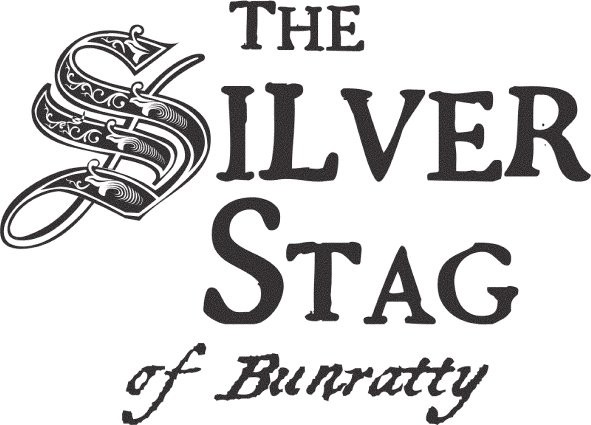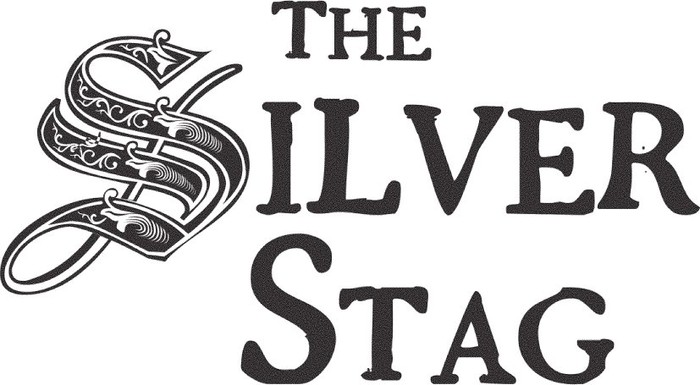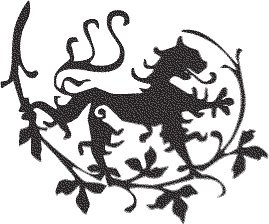The Silver Stag of Bunratty
Read The Silver Stag of Bunratty Online
Authors: Eithne Massey

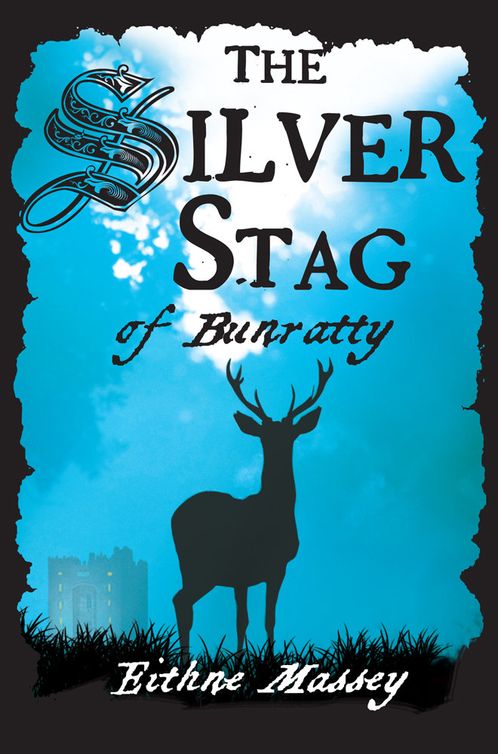
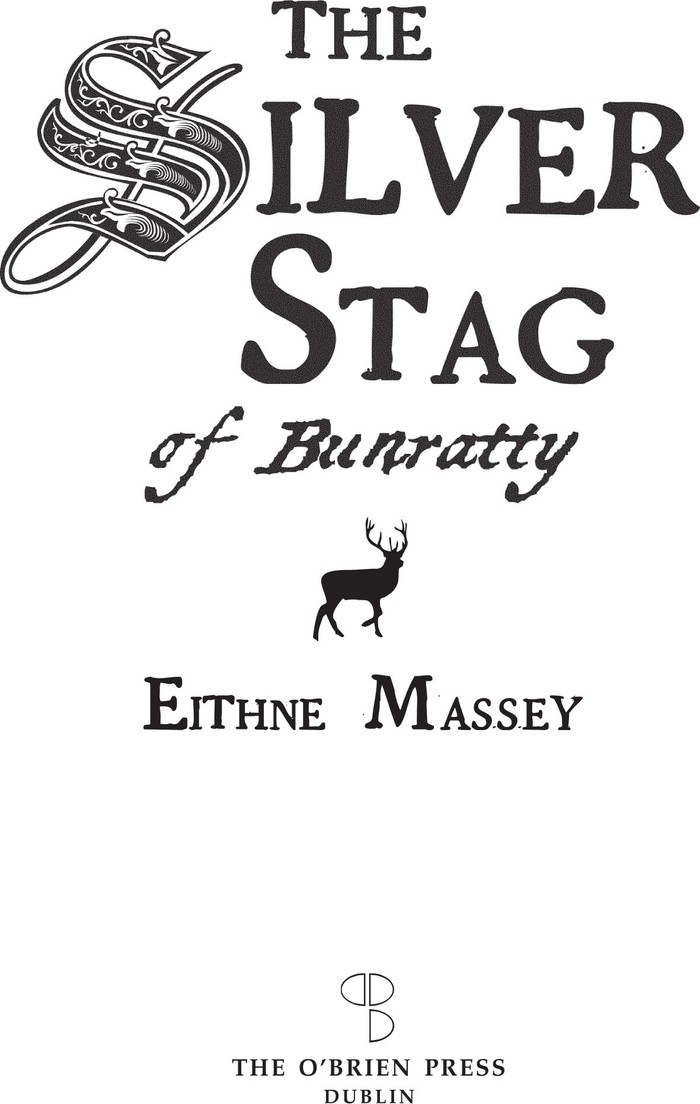
 uan shivered in the cold air. Even though it was dark, he could see that the river had become narrower. The branches of the trees on either side of the boat almost met over his head. Through the web of twigs and small leaves the full moon shone, its light split into a thousand silver pieces. It had been a thin crescent when they had taken him from his home. The familiar smell of water and mud was mixed with something else now. Tuan sniffed. Smoke, maybe? The boat slid under the branches of a blackthorn tree and the petals scattered over him, the thorns scratching his scalp. He bent his head as much as he could, but he could not put up his arms to protect himself because his wrists were tied in front of him and the rope secured around his waist. The Captain of the Guard, Fat John, had done that. Fat John had done it purely to
uan shivered in the cold air. Even though it was dark, he could see that the river had become narrower. The branches of the trees on either side of the boat almost met over his head. Through the web of twigs and small leaves the full moon shone, its light split into a thousand silver pieces. It had been a thin crescent when they had taken him from his home. The familiar smell of water and mud was mixed with something else now. Tuan sniffed. Smoke, maybe? The boat slid under the branches of a blackthorn tree and the petals scattered over him, the thorns scratching his scalp. He bent his head as much as he could, but he could not put up his arms to protect himself because his wrists were tied in front of him and the rope secured around his waist. The Captain of the Guard, Fat John, had done that. Fat John had done it purely to
humiliate him. He knew that Tuan would not try to escape.
Tuan raised his head and looked around him as the boat came clear of the trees. Even if he had wanted to escape, he would be completely lost in this strange country of field and river and low-lying lakes, far away from his home in the hills beyond Cratloe Forest. Around him, the landscape was silver, the shapes of the distant hills black.
Something silver flashed across the moonlit field and was gone in an instant. Tuan blinked. Was it some kind of animal? A horse, a deer? Animals were not silver; white or cream, maybe, like the horses in his father’s herds, but not silver. Was the colour a trick of the moon or of his tired eyes?
‘Look sharp now, we’ll need to pull in soon, ye stinking lazy dogs.’ Fat John was shouting, as usual.
By now Tuan heartily hated the Captain of the Guard. He was a huge, grossly fat man, wide and red and the owner of several chins, and a rough, red moustache that bristled on a face scarred from many fights. He never spoke without cursing and rarely without shouting. Tuan was careful never to catch his eye; he had been the victim of one too many of his casual, vicious blows.
He wondered if they had finally reached the castle. Please let it be so, he thought. He did not know what to
expect there, but nothing could be worse than the past few days. He had lost all sense of time. Life had become a nightmare, each day starting with a kick from one of the soldiers. As soon as he was up, he was bundled onto a mule, his wrists tied and the mule itself attached by a leading rope to the saddle of Fat John. Then, after a long day’s march, a meal of hard bread and sour ale eaten around fires that seemed to take forever to light in the cold, damp evenings of late spring.
At first, they had travelled through forest, where no-one cared if the branches whipped his face as they made their way through the trees. At every step, Tuan was afraid he might fall off, more afraid of the shame of it than the pain it would cause him. Then came the boat, the stink of fish and the putrid water at the bottom. He had gagged on it when Fat John had thrown him into it. Fat John looked on, laughing, as the boy struggled to sit upright.
The horses and dogs who accompanied the soldiers had been better treated than Tuan throughout the journey. But then, the animals themselves had treated him better than the soldiers had. He had even made friends with one of the half-grown dogs, a, brown-faced hound with shining, friendly eyes that Fat John referred to as Dumbutt, but Tuan had secretly named Gile, which in his language meant
‘brightness’.
The boat travelled from the broad banks of the Shannon into a smaller tributary, and now there was light along the shoreline and voices shouting in English. It was pulled to the left and Tuan was dragged ashore. Through the undergrowth he could see lights high in the sky. It must be a hill, he thought, but as they made their way through the trees, he realised that the lights, so high up, were shining from the castle itself. He stared. He had never seen a building this tall; but then, he had never been so close to a castle. Huge stone walls circled a tower, its whiteness looming over him out of the darkness. Fat John shouted, ‘Move on, or I’ll have your guts for garters and your livers for breakfast.’
Tuan struggled forward. He had a confused sense of crossing a bridge, of the harsh noise of a metal grid raised to let them in, of a vast doorway – and then he was inside the gates, his eyes blinking in the stinging smoke that came from the rushlights the guards held up to his face.
‘So this is the hostage, then,’ said one of them.
Fat John grunted and dragged Tuan into a small room just off the courtyard. He flung the boy inside, his hands still bound, so that he fell onto the floor, almost hitting his face.
‘Get in there and keep quiet, or you’ll feel my strap,’ the Captain of the Guard shouted as he slammed the door behind him.
Be brave, Tuan thought to himself. You are a Mac Conmara. We are the sea-dogs who know no fear. Be brave. He lay there, his head aching, his throat dry from thirst, his misery deepened by the fact that he could feel tears trickling down his face. At least there was no-one to see them.
The room was almost totally bare. He sniffed. The place smelt of pigs, with a faint undertone of chickens. Straw covered the floor, and a wooden bench had been placed under a tiny, barred window high up in the wall, with a pointed top like a church door. No light, except a thin line of moonlight that lit up one corner of the room. Just for a moment he thought he could see two other boys, bound and gagged like him, in the faint glow; but then he blinked and there was no-one there. He stared at that corner until the dawn started to break and a cock started crowing. Tuan felt as if it was crowing directly in his ear. Be brave, he told himself again. He was very tired of being brave. Finally, he managed to curl up on the floor. What he would have liked more than anything else was to be able to cover his face with his bound
hands.
He was woken by the noise of the door scraping against the stone floor. Two figures came into the room; one of them was carrying a bundle of clothes and the other a bowl and towels. Light streamed through the open door, blinding the boy.
Both figures were female, but they could not have been more different. The woman carrying the clothes was tall and almost as fat as Fat John; her face was round as a pudding, but she was beaming at him, though after a moment her cheerful look was replaced by a frown.
‘What state did that miscreant leave you in, then? And you a guest of my master. Here, girl, help me lift him onto the bench and we’ll take off those cords.’ She spoke in English.
The smaller figure was a girl of about his own age, or a little younger. She was thin and red-haired and she smiled at him, but said nothing. She set down the bowl she was carrying and helped the large woman shift Tuan onto the seat and untie his wrists. They were raw, bleeding from the rope. He rubbed his eyes and realised that his face was covered in blood from where the blackthorn had scratched him.
‘There, my lamb,’ said the fat woman, ‘Margaret will
look after you. Cliar, run to the stills cupboard and fetch some of Dame Anna’s green ointment. Here’s the key. Hurry now!’
The girl nodded and the woman spent the next few minutes fussing over Tuan, washing his wounds and his face and keeping up a stream of talk that at times Tuan found difficult to follow. His English was good; he had learned it from a boy his own age, a hostage who had stayed with his people for months. But Margaret never stopped to draw breath.
Finally she said, ‘And what’s your name, lad?’
‘I am Tuan, of the Mac Conmara clan of the hills east of the Cratloe woods.’ He said it proudly.
Margaret raised her eyebrows. She looked as if she was about to say something, but at that moment the girl came back with the ointment.
‘You put it on him, Cliar. You’re the one with the healer’s touch.’
While the girl smeared the cool, green paste on his wrists, Tuan had the chance to look at her more closely behind her curtain of hair. She was pale-skinned and freckled, like him, but her eyes were not blue like his, but a pale grey-green. She smiled at him shyly, but still said nothing. After the ointment had been rubbed on his wrists,
Tuan found that he could move them without pain.
‘Thank you,’ he said carefully, in English.
‘You’re welcome,’ she replied, in perfect Irish.
Tuan breathed a sigh of relief. At least some people in the castle spoke his language.
Margaret was laying out the clothes she had brought on the bed. ‘These look like a good enough fit and will be better than those barbarous rags you’re wearing. Now you, boy, get them on and make haste about it; Sir Richard wants to see you and you cannot go to him and his lady looking like a beggar. Come, Cliar, we must organise food for the lad. But eat it quickly, boy.’ She paused. ‘And just in case you were thinking of trying to escape, don’t. The castle is very well guarded.’
‘I will not try to escape. It would be against my honour.’
Margaret snorted. ‘Honour, indeed! All that kind of talk makes my head ache, and there’s far too much of it in this castle. Now, Fat John will be here soon to lead you to His Lordship. But I’ll have a word with him before he comes to you, so there will be no more roughness. Captain of the Guard or not, he’ll do as I say if he wants himself and his men to eat well while they’re here in Bunratty.’
They left, and Tuan began to struggle into his new clothes. They fitted him well enough, but their bright
colours and thin weaves felt strange, so different from the rough, warm wool and soft fur of home. Within a few minutes the young girl had brought him bread and milk. Tuan tried to talk to her, but although she smiled at him shyly, she would not stay. After he had gulped the meal down, he began to feel better. Margaret had annoyed him, but, after all, how could an Englishwoman like Margaret understand the Irish idea of honour that prevented any thought of escape? And at least she had treated him with courtesy, as a guest rather than a prisoner.
For he was not a prisoner. He had not been captured, but sent by his father, to be held hostage by Richard De Clare, Lord of Bunratty. Giving and taking hostages was a way of life in Thomond, indeed all over the island of Ireland and beyond. As long as he was held by Sir Richard, he was the guarantee that his father’s people would not attack the castle or the lands surrounding it. As long as they kept the peace, he would be treated well. But if his father’s branch of the Mac Conmaras – McNamaras, as they were now sometimes called – went to war against the English, things would be very different for him. He would certainly be maimed, losing an eye or an ear. He might even be killed.
